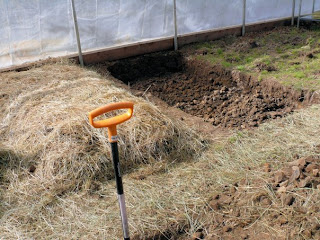Most organic farmers use blood and bone meals, among other things, to grow their produce. Its not that is cheaper and quicker than using natural vegan compost, its just more common. Even organic farmers who are using mostly compost and green manures are constantly tempted to add some blood meal or fish fertilizer to add nitrogen to the soil to grow their plants quicker and larger. Unless a farmer has vegan standards there is always a temptation to use animal by products since they are in almost everything. The production of meat and dairy the United States has so many by-products from the slaughter houses that they need to get rid of it. Chemical filled manures, feather meal from the vast amount of chickens produced, blood, bone meals from slaughter house animals and fish emulsion are all commonly used in the industry.
What does it take to grow healthy organic food? Good rich soil, adequate water and sunshine. Good rich soil capable of supporting abundant plant growth has several components.
There are three major components, nitrogen, phosphorus, and potash, called N-P-K. These can be supplied chemically, with animal residues, or by natural plants and minerals.
Nitrogen is easily furnished by alfalfa pellets or other seed meals. Phosphorus is easily attained from mined minerals, and potash also comes with the alfalfa meal, but a little bit of kelp will add this to the soil as well. The handful of trace minerals that you need come with kelp or can be added with granite dust rock powders. All these products are cheap and are not even needed if you grow green manure crops and make your own compost. Here is a complete balanced vegan fertilizer the home gardener can make up herself:
4 parts (by volume) of organic alfalfa meal (sold in 50 lb bags as horse food at farmer supply stores)
1 1/2 parts rock phosphate ( a naturally occurring mineral also bought in 50 lb bags)
1/2 part equal portions of agricultural lime and gypsum
A green manure crop is one that can be grown over a season when the bed is not in use, often fall and winter, and later tilled into the soil to improve the fertility.
This basic formula gives a balanced complete fertilizer, relatively inexpensively and 100% organic and veganic.
Of course a good gardener or farmer, giving a few years to improve her soil, will not need to add any of these amendments to grow healthy abundant plants, but in the beginning they can be useful . To farm without them one relies on compost and green manures, with the occasional addition of local materials, kelp for instance here near the coast where we have free and easy access to it.
Green manures usually perform multiple functions, that include soil improvement and soil protection:
- Leguminous green manures such as clover and vetch contain nitrogen-fixing symbiotic bacteria in root nodules that fix atmospheric nitrogen in a form that plants can use. Her ewe scatter rye and vetch over our gardens in the fall when the rains begin and they grow all winter and are tilled in in spring, enriching the soil tremendously and adding to its organic content. We can even grow peas or fava beans to accomplish the same thing and have a food crop from them as well.
- Green manures increase the percentage of organic matter (biomass) in the soil, thereby improving water retention, aeration, and other soil characteristics.
- The root systems of some varieties of green manure grow deep in the soil and bring up nutrient resources unavailable to shallower-rooted crops.
- Common cover crop functions of weed suppression and prevention of soil erosion and compaction are often also taken into account when selecting and using green manures.
- Some green manure crops, when allowed to flower, provide forage for pollinating insects.
I love gardening & growing food it is not only grounding for me but also magical. Here are some photos of my veganic garden below.












